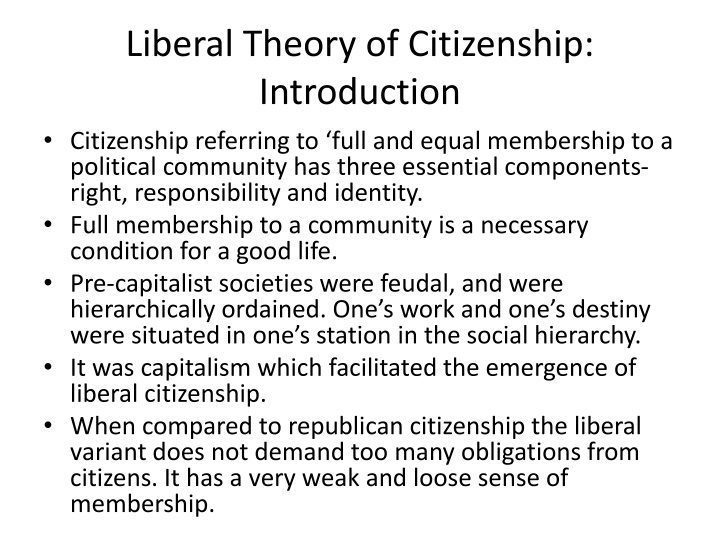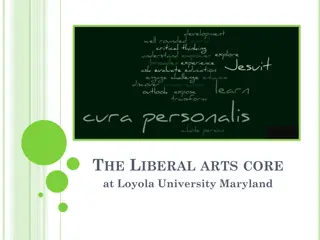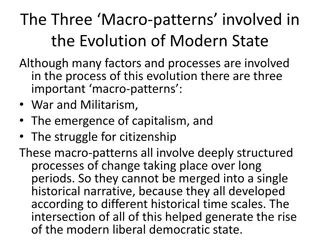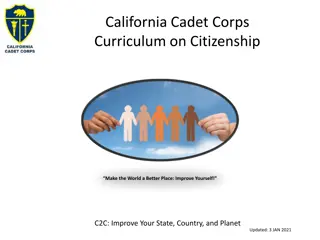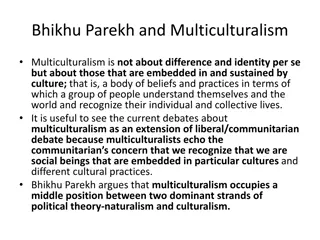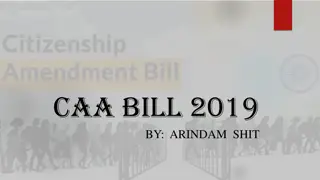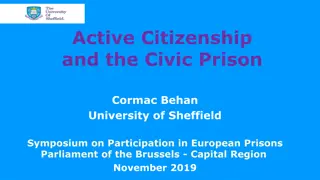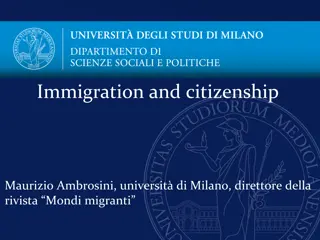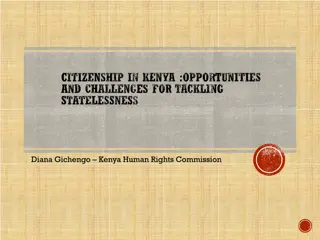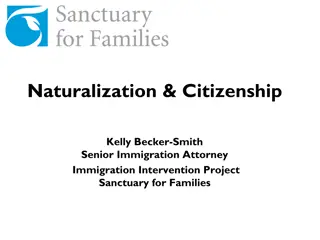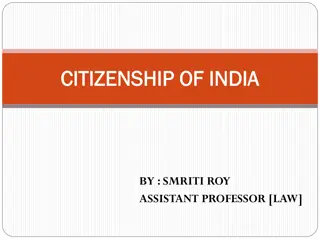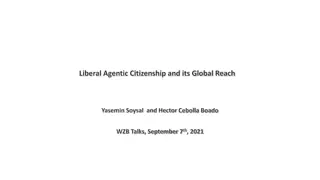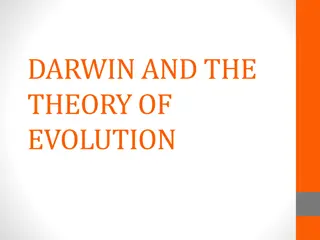Evolution of Liberal Citizenship Theory
The liberal theory of citizenship emphasizes the essential components of right, responsibility, and identity within a political community. It contrasts with pre-capitalist societies by offering a weak sense of membership and reduced citizen obligations. The addition of social rights has brought an egalitarian aspect to liberal citizenship, challenging its individualistic roots. Notable thinkers like T.H. Marshall, J.S. Mill, and T.H. Green have contributed to reshaping classical liberal theory by reconciling social and individual aspects of human life. Marshall's tripartite analysis categorizes citizenship into civil, political, and social components, reflecting the historical evolution of rights over three centuries. This evolution follows a sequential logic, with each set of rights building upon the previous.
Download Presentation

Please find below an Image/Link to download the presentation.
The content on the website is provided AS IS for your information and personal use only. It may not be sold, licensed, or shared on other websites without obtaining consent from the author.If you encounter any issues during the download, it is possible that the publisher has removed the file from their server.
You are allowed to download the files provided on this website for personal or commercial use, subject to the condition that they are used lawfully. All files are the property of their respective owners.
The content on the website is provided AS IS for your information and personal use only. It may not be sold, licensed, or shared on other websites without obtaining consent from the author.
E N D
Presentation Transcript
Liberal Theory of Citizenship: Introduction Citizenship referring to full and equal membership to a political community has three essential components- right, responsibility and identity. Full membership to a community is a necessary condition for a good life. Pre-capitalist societies were feudal, and were hierarchically ordained. One s work and one s destiny were situated in one s station in the social hierarchy. It was capitalism which facilitated the emergence of liberal citizenship. When compared to republican citizenship the liberal variant does not demand too many obligations from citizens. It has a very weak and loose sense of membership.
Social Rights and the Egalitarian thrust to Liberal Citizenship The addition of social rights to the fold of liberal citizenship curbed the latter s individualist obsessions and provided an egalitarian thrust to it. Thus, the relationship between citizenship and capitalism started fraying. The modern State is caught in the middle. The normative question that arises here is what should the state do in this context. Prof. T.H. Marshall in his celebrated essay titled Citizenship and Social Class addresses this question on a sound theoretical basis.
The Foundations of Social Citizenship in the Tradition of Classical Liberalism Prior to Marshall, J.S. Mill and T.H. Green had sparked a rethinking of classical liberal theory. The critical question for Mill was how to reconcile the social and individual aspects of human life. Mill argues that important freedoms must be situated in a social context. Mill recognizes the worth of the community in promoting the good of citizens. Likewise, Green does not consider individuals to have rights against the state, rather, it is the state which provides social recognition to rights and removes the hindrances to good life.
Marshalls Tripartite Analysis of Citizenship Drawing on Mill and Green, later social liberals hoped that this theory would have the potential to reduce the conflicting relationship between capitalism and citizenship. T.H. Marshall is the most prominent among these thinkers. Marshall s tripartite analysis of citizenship is divided into civil, political and social components: i. Civil- Rights necessary for individual freedom, e.g. liberty of person, freedom of speech, thought and faith, right to own property and enter into contracts, and the right to justice. ii. Political- the right to participate in the political process, e.g. right to franchise, right to contest and to hold public office etc. as a member of a political community. iii. Social- a whole range of rights, from the right to a modicum of economic welfare and security to the right to share to the full in the social heritage and to live the life of a civilized being according to the standards prevailing in the society.
Evolution of Civil, Political and Social Rights over three Successive Centuries According to Marshall civil, political and social rights evolved in the eighteenth, nineteenth and twentieth centuries, respectively. The process of evolution followed a sequential logic. One set of rights set the stage for the rise of the next set in a sequential order. For Marshall citizenship is not simply a conjunction of civil and political rights. It is not enough to have merely an equal moral worth , which civil rights ensured. Civil rights were dispensed with a presupposition that one was equipped with the means to protect oneself against social and economic insecurities.
Social Citizenship- a Vital Underpinning for the other Two Marshall argued that civil rights were meaningless unless buttressed by social rights. Social rights provide equal social worth , which is at the heart of social citizenship. It gave a direct sense of community membership based on loyalty to a civilization, which was a common possession.
States Mediation between Citizenship and Capitalism Citizenship is a principle by which social life is organized on the basis of equality. In contrast, capitalism is a system of class inequalities. The ethic of capitalism entails the maximization of profit, regardless of whether it endangers community membership. Such a tendency legitimizes the need for state intervention. Marshall invested the state with the power to deliver welfare functions. In the schema of a welfare state, welfare is considered a social right. The state bears an obligation to guarantee a minimum supply of goods and services to the people, referred to as social security . The state also assures persons of their right to a share in the social heritage, which gives them a sense of being citizens. Marshall s chief concern was to moderate, reform and civilize the liberal-capitalist society, and he believed that social citizenship could do the job.
Rawls and Social Citizenship Rawls too was enthusiastic about the welfare state as he believed that it could ameliorate the hardship of the worst-off without destroying the ethic of liberalism. The core of the libertarian argument is that the market would generate an automatic effect to alleviate the misery of the worst-off. Rawls radically altered this libertarian position and in his view, all distributive questions are to be settled by the state. The state is the key agency to perform distributive tasks in such a way that the worst-off gets the best deal.
Critical Evaluation of Marshalls Theory The social citizenship of Marshall and Rawls is agency- based as for both the state is the agency to facilitate conditions for a good life. The critics having a left leaning argue that both Marshall and Rawls forget that even the state can act to further the interest of a particular class as inequalities in capitalist societies are structural. Feminist theories, since the 1970s, have also sharply criticized the liberal model of social citizenship. The feminist scholars contend that liberal citizenship is sharply gendered as it perpetuates the private/public dichotomy.
Methodological Limitations: Anthony Giddens Marshall s approach to citizenship has been criticized as being faulted on methodological grounds. Critics like Anthony Giddens find a strong teleological element in Marshall s account of tripartite citizenship. It is argued that compartmentalizing citizens rights into three sets is misleading. In a social analysis, when events are explained in terms of the telos (goals, purpose) that are going to be achieved, it is called teleological method. The accomplishment of the telos follows a logical pattern.
Teleological Element in Marshalls Theory (contd.) In Giddens view, Marshall has treated citizenship as though it has unfolded in phases according to some inner logic inherent to the modern era. By attributing the evolution of citizenship to a structural logic, Marshall meant to imply that the said evolutionary process was smooth and deterministic. Hence, one set of rights prepared the stage for achieving another set of rights in a sequential order. Marshall underlined the indispensability of this process.
Critical Evaluation of Marshalls Theory (contd.) Critics charge Marshall with obscuring many historical facts and undermining the role of social movements in obtaining citizenship rights. Marshall has overstressed the indispensability of the evolutionary process. Giddens finds a crisis of cogency in Marshall s defence of civil citizenship as a homogeneous category of rights. Giddens distinguishes civil rights for individual freedom from economic civil rights. While the former were secured by the struggle of the emergent bourgeoisie the latter were won by the struggle of the working class. It is also problematic for Giddens that Marshall has treated the expansion of citizenship rights as an irreversible process . However, the rise of libertarianism and New Right theories has proved otherwise. Besides, Giddens also sees in Marshall s account an oversimplification of the role of state and politics.
Critical Evaluation-----(contd.) The three variants of citizenship are complementary components in Marshall s theory. But the thesis can be faulted as while civil citizenship is directed against the state, social citizenship is guaranteed by the state. Social rights and civil rights are at loggerheads in view of the fact that the expenditure for social security is met through progressive taxation which invades the civil rights of individuals. According to David Held, in Citizenship and Social Class Marshall was referring to major social movements that have shaped the contemporary world and in his later works Marshall is even more explicit about formative role of political and social conflict . There is also a common criticism against social citizenship that it breeds a culture of dependency . It develops a tendency towards state paternalism, and thus promotes a notion of passive citizenship .
Critical Evaluation-----(contd.) Autonomy theorists speak the language of moral independence and moral freedom. There are two distinct ideas behind autonomy: i. One is that people should not be dominated by others, not even by the state. ii. The other, as Joseph Raz states, is that they should be self-governing creators of their own moral world . This is an important and a good reason why an autonomy theorist would object to the paternalistic thrust of social citizenship.
Critical Evaluation-----(contd.) Though Marshall s social citizenship seeks to correct the economic inequalities that compromise one s ability to act autonomously, it fails to consider autonomy in terms of capacity , which is impaired in many ways other than economic asymmetries- e.g. caste, ethnic and gender hierarchies prohibit free choice and preferences in one s social life. Social citizenship theories are accompanied by an overwhelming quest for security; the problem, though, is that the quest for security is often attended to at the cost of dignity and integrity. It undermines autonomy.
